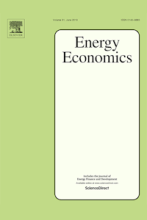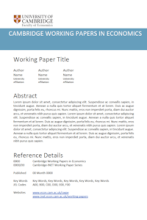Global temperatures have increased significantly in the past half century and extreme weather events are becoming more frequent and severe. Climate change is not only affecting low-income countries, but also advanced economies—in September 2017 while Los Angeles experienced the largest fire in its history, Hurricanes Harvey and Irma caused major destruction in Texas and Florida, respectively. A persistent rise in temperature, changes in precipitation patterns and/or more volatile weather events can have long-term macroeconomic effects by adversely affecting labour productivity, slowing investment and damaging human health; something that is usually overlooked in the literature owing to the focus of existing studies on short-term growth effects.
We investigate the long-term macroeconomic effects of climate change across 174 countries over the period 1960 to 2014. We link deviations of climate variables (temperature and precipitation) from their historical norms to changes in real output per capita. We estimate the size of income effects across countries; assess whether the effects are temporary or permanent; allow for human activity to also affect climate change; investigate the relative importance of climate change for poor (hot) economies versus rich (cold) countries; and study the channels of impact and the sectors that are affected the most. Also, by using deviations of climate variables from their respective historical norms, while allowing for nonlinearity, we avoid the econometric pitfalls associated with the use of trended variables, such as temperature, in output growth equations in previous studies.
Our results suggest that a persistent change in climate has a long-term negative effect on per capita GDP growth. Specifically, we show that if temperature rises (falls) above (below) its historical norm by 0.01°C annually, per capita income growth will be lower by about 0.05 percentage points per year. Furthermore, we show that our empirical findings apply equally to poor or rich, and hot or cold countries. This is contrary to most of the literature which finds that temperature increases have uneven macroeconomic effects, with adverse consequences in countries with hot climates.
We perform several counterfactual exercises to investigate the cumulative income effects of annual increases in temperatures over the period 2015-2100 (when compared to a baseline scenario under which temperature in each country increases according to its historical trend of 1960-2014). We show that an increase in average global temperatures of 0.04°C per year (assuming high greenhouse gas emissions and no additional measures to combat climate change) reduces world’s real GDP per capita by around 7 percent by 2100, albeit with varied effects across countries. We also show that the estimated losses under the RCP 8.5 scenario would be significantly higher if the country-specific variability of climate conditions were to rise commensurate to temperature increases. However, keeping the increase in the global average temperature to below 2 degrees Celsius above pre-industrial levels as agreed by 190 parties in Paris in December 2015, will reduce the damage to only 1 percent by 2100.
Moreover, our results suggest that all regions (cold or hot, and rich or poor) would experience a relatively large fall in GDP per capita by 2100 in the absence of climate change policies. The size of these income effects varies significantly across countries depending on the speed with which temperatures increase above their norms; for instance, for the United States the losses are relatively large at around 10 percent without mitigation/adaptation efforts by 2100 (reflecting a sharp increase in above-norm average temperatures), but the loss would be limited to 2% under the Paris Agreement. Moreover, the speed with which the historical norms change, that is how fast countries adapt to climate change, affects the size of income losses (e.g., more adaptation means less damage).
We also examine the robustness of our findings and the channels of impact, using panel data sets of different economic indicators across 48 U.S. states over the period 1963 to 2016. While cross-country studies are informative, they also have drawbacks. Averaging temperature and precipitation data at the country level leads to a loss of information, especially in geographically diverse countries such as Brazil, China, India, Russia and the United States. The within-country geographic heterogeneity of the United States enables us to compare whether economic activity in `hot' or `wet' states responds to a temperature increase in the same way as economic activity does in `cold' or `dry' states. The richness of the U.S. data also allows for a more disaggregated study of the climate change-growth relationship and enables us to test whether the country at the aggregate level, parts of the country, or sectors of the economy have been more successful in their adaptation/mitigation efforts. To do so, we conduct a case study of the U.S. using various state-specific economic performance indicators at the aggregate and sectoral levels.
Our within-country results provide evidence for the damage that climate change causes in the United States using various economic indicators at the state level: growth rates of Gross State Product (GSP), GSP per capita, labour productivity, and employment as well as output in different sectors (e.g., agriculture, manufacturing, services, retail and wholesale trade). We estimate that if temperature increases by 0.01°C annually above its historical norm across U.S. states, average per-capita real GSP growth will be lower by about 0.03 percentage points per year–a number that is smaller than those obtained in our cross-country regressions. We show that while certain sectors in the U.S. economy might have adapted to higher temperatures, economic activity in the U.S. overall and at the sectoral level continues to be sensitive to deviations of temperature and precipitation from their historical norms. Moreover, in contrast to our cross-country results, the within United States estimates tend to be asymmetrical with respect to deviations of climate variables from their historical norms (in the positive and negative directions).
Our findings call for a more forceful policy response to the threat of climate change, including more ambitious mitigation and adaptation efforts.
Rising Temperatures, Falling Ratings: The Effect of Climate Change on Sovereign Creditworthiness
Rising Temperatures, Falling Ratings: The Effect of Climate Change on Sovereign Creditworthiness, Patrycja Klusak, Matthew Agarwala, Matt Burke, Moritz Kraemer and Kamiar Mohaddes, Management Science (2023).
Enthusiasm for “greening the financial system” is welcome, but a fundamental challenge remains: financial decision makers lack the necessary information. It is not enough to know that climate change is bad. Markets need credible, digestible information on how climate change translates into material risks. To bridge the gap between climate science and real-world financial indicators, we simulate the effect of climate change on sovereign credit ratings for 109 countries, creating the world’s first climate-adjusted sovereign credit rating. Under various warming scenarios, we find evidence of climate-induced sovereign downgrades as early as 2030, increasing in intensity and across more countries over the century. We find strong evidence that stringent climate policy consistent with limiting warming to below 2 °C, honoring the Paris Climate Agreement and following representative concentration pathway (RCP) 2.6, could nearly eliminate the effect of climate change on ratings. In contrast, under higher emissions scenarios (i.e., RCP 8.5), 59 sovereigns experience climate-induced downgrades by 2030, with an average reduction of 0.68 notches, rising to 81 sovereigns facing an average downgrade of 2.18 notches by 2100. We calculate the effect of climate-induced sovereign downgrades on the cost of corporate and sovereign debt. Across the sample, climate change could increase the annual interest payments on sovereign debt by US$45–$67 billion under RCP 2.6, rising to US$135–$203 billion under RCP 8.5. The additional cost to corporations is US$10–$17 billion under RCP 2.6 and US$35–$61 billion under RCP 8.5.
Climate Change and Economic Activity: Evidence from U.S. States
Climate Change and Economic Activity: Evidence from U.S. States, Ramit Debnath, Ronita Bardhan, Darshil U. Shah, Kamiar Mohaddes, Michael H. Ramage, R. Michael Alvarez and Benjamin K. Sovacool, Oxford Open Economics, Vol 2 (2023)
We investigate the long-term macroeconomic effects of climate change across 48 U.S. states over the period 1963-2016 using a novel econometric strategy that links devia tions of temperature and precipitation (weather) from their long-term moving-average historical norms (climate) to various state-specific economic performance indicators at the aggregate and sectoral levels. We show that climate change has a long-lasting adverse impact on real output in various states and economic sectors, and on labour productivity and employment in the United States. Moreover, in contrast to most cross-country results, our within U.S. estimates tend to be asymmetrical with respect to deviations of climate variables (including precipitation) from their historical norms.
Long-Term Macroeconomic Effects of Climate Change: A Cross-Country Analysis
Long-Term Macroeconomic Effects of Climate Change: A Cross-Country Analysis, Matthew E. Kahn, Kamiar Mohaddes, Ryan N. C. Ng, M. Hashem Pesaran, Mehdi Raissi, and Jui-Chung Yang, Energy Economics, Vol 104 (2021).
We study the long-term impact of climate change on economic activity across countries, using a stochastic growth model where productivity is affected by deviations of temperature and precipitation from their long-term moving average historical norms. Using a panel data set of 174 countries over the years 1960 to 2014, we find that per-capita real output growth is adversely affected by persistent changes in the temperature above or below its historical norm, but we do not obtain any statistically significant effects for changes in precipitation. We also show that the marginal effects of temperature shocks vary across climates and income groups. Our counterfactual analysis suggests that a persistent increase in average global temperature by 0.04 °C per year, in the absence of mitigation policies, reduces world real GDP per capita by more than 7 percent by 2100. On the other hand, abiding by the Paris Agreement goals, thereby limiting the temperature increase to 0.01 °C per annum, reduces the loss substantially to about 1 percent. These effects vary significantly across countries depending on the pace of temperature increases and variability of climate conditions. The estimated losses would increase to 13 percent globally if country-specific variability of climate conditions were to rise commensurate with annual temperature increases of 0.04 °C.
Rising Temperatures, Melting Incomes: Country-Specific Macroeconomic Effects of Climate Scenarios
Rising Temperatures, Melting Incomes: Country-Specific Macroeconomic Effects of Climate Scenarios, Kamiar Mohaddes and Mehdi Raissi, Cambridge Working Papers in Economics, CWPE2429 (2024)
We estimate country-specific annual per-capita GDP losses from global warming using the most recent climate scenarios of the Intergovernmental Panel on Climate Change (IPCC) under different mitigation, adaptation, and climate variability assumptions. Our results indicate that without significant mitigation and adaptation efforts, global GDP per capita could decline by up to 24 percent under the high-emissions climate scenarios by 2100. These income losses vary significantly across the 174 countries in our sample, depending on the projected paths of temperatures and their variability.
Matthew E. Kahn, Johns Hopkins University
Kamiar Mohaddes, Judge Business School and King’s College, University of Cambridge
Ryan N. C. Ng, Faculty of Economics and Girton College, University of Cambridge
M. Hashem Pesaran, Department of Economics, University of Southern California and Trinity College, Cambridge
Mehdi Raissi, International Monetary Fund
Jui-Chung Yang, Department of Economics, National Tsing Hua University
Gates Cambridge have launched a podcast series. Kamiar Mohaddes was featured in the episode "How do we build back better after a crisis?", which looked at the climate, environment and green innovation. What he spoke about was based on his Keynes Fund sponsored research. You can listen to the podcast above, or choose how to listen to it here: https://so-now-what.captivate.fm/listen







